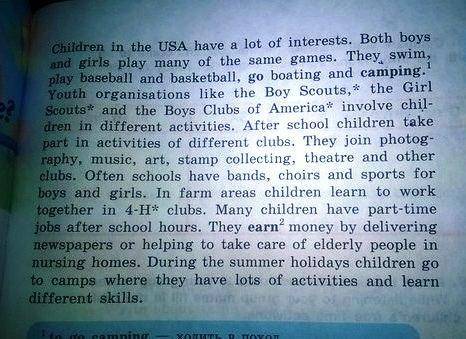У детей США много интересов. И мальчики, и девочки играют в большое количество одних и тех же игр. Они плавают, играют в бейсбол и баскетбол, плавают на лодках и ходят в походы. Молодёжные организации типа бойскаутов, гёрлскаутов, молодежных клубов Америки вовлекают детей в разные занятия. После школы дети принимают участие в различных клубах. Они занимаются фотографией, музыкой, искусством, коллекционированием марок, участвуют в театральных и прочих кружках (студиях). Часто в школах есть собственные ансамбли, хоры и спортивные секции для мальчиков и девочек. В сельской местности дети учатся работать вместе в клубах «4-H». Многие дети подрабатывают после школьных уроков. Они зарабатывают деньги, доставляя газеты или пожилым людям в домах престарелых. На летних каникулах дети ездят в лагеря, где занимаются различными видами деятельности и приобретают всевозможные навыки.

Complete the sentences using nouns formed from the verbs in brackets.
1. The ... of America was made in 1492 by Christopher Columbus.
(discovery)
2. I can't tell the ... between butter and margarine. (difference)
3. Susie takes after her father in (appearance)
4. The staff at this hotel is excellent. They give very good (service)
5. The ... to the park is through the gate over there. (entrance)
6. The American ... of this word is different from the British. (usage)
7. We'll have to stay at this hotel. There's no ... . (choice)
8. You need more... if you want to speak good English. (practice)
9. The police said they were awaiting further (development)
10. He can't get over the ... of so much money. (loss)
11.She accepted his ... for his rude behaviour at dinner. (apologies)
12.There is a ... at the bottom of the letter, but I can't make it out. (signature)
13. I made an ... to see the dentist tomorrow (appointment)
14.The film didn't come up to our ... at all. (expectations)
15. It will be very helpful if you continue your … . (investigation)